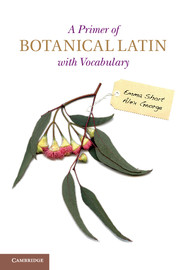Book contents
- Frontmatter
- Contents
- Preface
- Acknowledgements
- Introduction
- Part I Grammar
- 1 The noun
- 2 The adjective and the participle
- 3 The adverb
- 4 The preposition
- 5 The conjunction
- 6 The pronoun
- 7 The verb
- 8 Numerals, measurements (Stearn pp. 107–117)
- 9 Prefixes and suffixes
- 10 Miscellany
- Part II Exercises in translation
- Part III Translating
- Part IV Vocabulary
- References and further reading
- Index
10 - Miscellany
Published online by Cambridge University Press: 05 April 2013
- Frontmatter
- Contents
- Preface
- Acknowledgements
- Introduction
- Part I Grammar
- 1 The noun
- 2 The adjective and the participle
- 3 The adverb
- 4 The preposition
- 5 The conjunction
- 6 The pronoun
- 7 The verb
- 8 Numerals, measurements (Stearn pp. 107–117)
- 9 Prefixes and suffixes
- 10 Miscellany
- Part II Exercises in translation
- Part III Translating
- Part IV Vocabulary
- References and further reading
- Index
Summary
Time
You may wish to express time, e.g. the time when a flower opens or the fruit matures, or the season of flowering. To express a time at which something happens (date, time of day, season etc.), we use the ablative, e.g. hieme (in winter), nocte (at night). The time within which something happens is also shown by the ablative:
semina mensibus duobus [2] maturescentia seed ripening within 2 months.
And the time during which something happens is shown by the accusative:
planta annos quinque [5] vivens plant living for 5 years.
Some useful expressions are:
in alabastro in bud
in maturitate at maturity
in juventute in youth, at a young state
ad anthesin/anthesem at flowering time
post anthesin/anthesem after the flower opens.
Habitat (Stearn pp. 197–200)
A plant’s habitat is usually included in a Latin description only if it is significant in distinguishing the taxon from a closely related one, e.g. growing on dry hills in contrast to one that grows in swamps. The common relevant verbs are:
habitat it lives
crescit it grows
occurrit it occurs
incolit it inhabits.
- Type
- Chapter
- Information
- A Primer of Botanical Latin with Vocabulary , pp. 59 - 64Publisher: Cambridge University PressPrint publication year: 2013



